| SHADOWS ON THE WALL | REVIEWS | NEWS | FESTIVAL | AWARDS | Q&A | ABOUT | TALKBACK | |||||
 Shadows off the beaten path Shadows off the beaten pathIndies, foreign, docs and shorts...
On this page:
AVA |
ENTWINED |
PINOCCHIO
| |||||
| See also: SHADOWS FILM FESTIVAL | Last update 27.Aug.20 | |||||
|
Ava Review by Rich Cline | 
| |||||
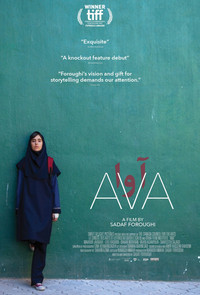 dir-scr Sadaf Foroughi prd Kiarash Anvari, Sadaf Foroughi with Mahour Jabbari, Bahar Nouhian, Vahid Aghapour, Leili Rashidi, Shayeste Sajadi, Sarah Alimardani, Houman Hoursan, Pantea Tajbakhsh, Haydeh Hosseinzadeh, Mona Ghiasi, Parnian Akhtari, Asal Karimi release US Mar.18 ndnf, UK 21.Aug.20 17/Iran 1h42 TORONTO FILM FEST Now streaming... |
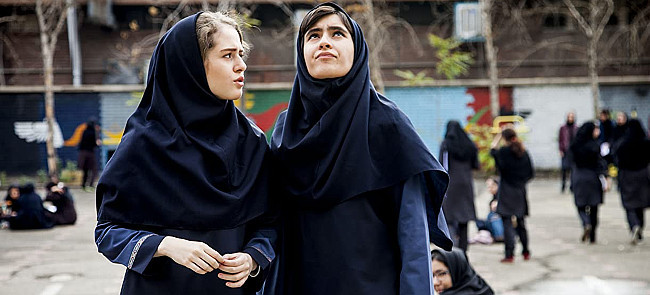 There's an earthy, realistic tone to this drama, which explores adolescent independence through the eyes of a teenage girl in Iran. While her feelings are easy to identify with, her culture reveals itself to be frighteningly controlling at every level, steadily removing her options. Inventively written, directed and photographed, this is an often chilling story of a young woman trying to make her own choices in a controlling society. In Tehran, Ava (Jabbari) is a typical teen navigating the expectations of her easygoing father (Aghapour) and demanding mother (Nouhian), plus the usual peer pressures from her best friends Melody and Shirin (Sajadi and Alimardani). Ava is too intelligent to just go with the flow, but her teachers and doctors undermine her sense of self, conspiring with her mother to remove her freedom and her options. And things close in further after she concocts a plan to spend some private time with Nima (Hoursan), the pianist who accompanies her when she plays violin. While the plot's pacing is somewhat uneven, the film is full of gentle dialog that digs into the characters' thoughts and feelings, such as how Ava's mother and father disagree about whether she should pursue her passion for music or a more lucrative career. That this conversation is within Ava's earshot is provocative and insightful, a remarkable counterpoint to what follows, as every aspect of her privacy is invaded. So the fact that her parents were even more transgressive as teens than she is makes a salient point. Jabbari has terrific presence as the observant, annoyed Ava, who is labelled as a rebel for wearing red hi-top sneakers or makeup, talking to boys or plotting with her forbidden friends. Her moodiness and brazen deception are understandable here as survival instincts. As the white-gloved headmistress, Rashidi is wonderfully villainous, warning the girls their minds are already polluted. Although the real problem here is Ava's intractable mother, played unapologetically by Nouhian as a control freak who only pretends to care about anyone else. This is a remarkably textured drama, packed with characters who spring vividly to life thanks to layered interaction and subtly revealing performances. And Foroughi's direction is smart and pointed, deploying skilful long takes and wide shots, sometimes pointedly keeping characters out of focus in the background or obscuring their words. The scene in which Ava finally snaps at her mother is simply breathtaking, not only in how it's shot and played, but in what it says about parent-child relationships in any country on earth.
| ||||
|
Entwined Review by Rich Cline | 
| |||||
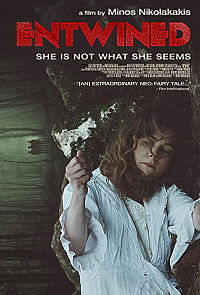 dir Minos Nikolakakis scr John De Holland prd Minos Nikolakakis, Lilette Botassi with Prometheus Aleiferopoulos, Anastasia-Rafaella Konidi, John De Holland, Maria Eglezaki, Kostas Laskos, Aleka Toumazatou, Manos Vakousis release Gr Nov.19 tiff, US 28.Aug.20 19/Greece 1h28 TORONTO FILM FEST Now streaming... |
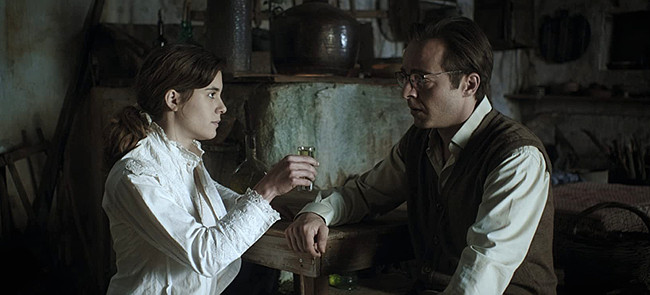 This Greek fairy tale mixes current societal angst with ancient mythology, following the odyssey of a young man who stumbles into what feels like an alternate reality. Filmmaker Minos Nikolakakis creates an atmosphere that pulses with intense emotions and pitch-black horror, so it's both sweet and unnerving at the same time. But the script never adds resonance to the idea, or enough surprises to sustain the slim running time. As a doctor, Panos (Aleiferopoulos) is wounded that he was unable to save his father from cancer, so he abandons the city to offer personalised care in an isolated village. So he's taken aback when the suspicious locals tell him he's their first-ever doctor. He quickly develops a fascination with Danae (Konidi), a young woman who lives outside the village with her angry-drunk father (Laskos) and has strange skin lesions. But while Panos sees Danae as a damsel in need of rescuing, there's something far more perilous going on here. The film is beautifully designed, contrasting glaring urban sunshine with the inky shadows in a crumbling village overgrown with greenery. The locals whisper of a curse in the forest, warning Panos that science can't interfere with God's work. Time seems to move at a different pace here, and ancient cures work better than modern medicine. Perhaps this is all a dream. Or a result of drinking a bit too much of the local firewater. Alas, it quickly becomes clear where this is going, leaving the movie in a rut. Performances are heightened and uneven, which adds a melodramatic tone. Aleiferopoulos gives Panos a sympathetic sense of disorientation as he struggles to be rational in such an inexplicable situation. By contrast, Konidi's Danae is eerily offhanded when she says things like, "Maybe the trees don't want you to leave." Later she tells Panos her secret, and he has to make a momentous decision. As Panos' worried brother, writer De Holland provides some outside perspective. This is an inventive depiction of the clash between logic and faith, exploring the pointlessness of trying to cram a complex, confusing world into a tidy box. The script playfully spins ideas of God, mother nature, humanism and romance into a heady brew. Each scene is skilfully photographed to capture lush natural beauty as well as hideous implications, contrasting light and darkness within each scene. And as the plot develops, it evokes a desperate urgency. But since so many clues have been dropped along the way, the message is somewhat muddled, and the final act lacks its intended punch.
| ||||
|
Pinocchio Review by Rich Cline | 
| |||||
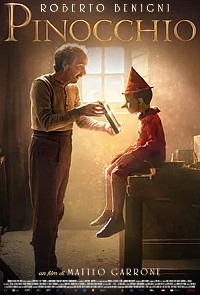 dir Matteo Garrone scr Matteo Garrone, Massimo Ceccherini prd Matteo Garrone, Jean & Anne-Laure Labadie, Jeremy Thomas, Paolo Del Brocco with Roberto Benigni, Federico Ielapi, Gigi Proietti, Rocco Papaleo, Massimo Ceccherini, Marine Vacth, Alida Baldari Calabria, Maria Pia Timo, Massimiliano Gallo, Gianfranco Gallo, Davide Marotta, Alessio Di Domenicantonio release It 19.Dec.19, UK 14.Aug.20 19/Italy Rai 2h05 BERLIN FILM FEST Now streaming... |
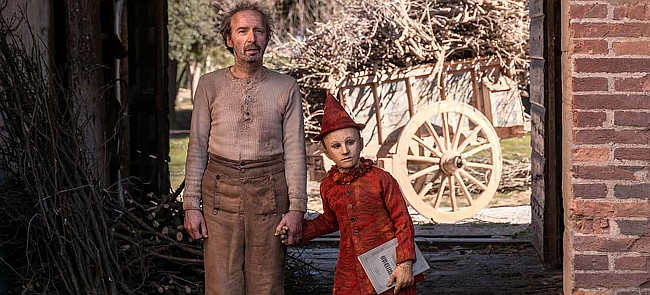 With this faithful adaptation of Carlo Collodi's iconic 1883 novel, Italian filmmaker Matteo Garrone teams with actor Roberto Benigni, plus gifted cinematographer Nicolaj Bruel and some clever effects artists. The film is strikingly well-made, with a loose sense of physicality, strongly idiosyncratic characters and a willingness to get properly dark and nasty. Not only will kids love this, but it makes the happy moments that much more evocative. In a Tuscan village, poverty-stricken chatterbox Geppetto (Benigni) is struck with an idea to earn a living as a puppeteer, so he carves Pinocchio (Ielapi) from an unwanted log. And Pinocchio comes to life. While Geppetto is delighted to be a father, the boy is fiercely independent. He rejects the helpful advice of a talking cricket (Marotta), then runs away from school to join a puppet show, winning the heart of its director Mangiafuoco (Proietti). Then as he tries to return home, most of the people he meets on the road take advantage of him. This parable about a stubbornly disobedient child is told through a series of little adventures, as Pinocchio travels across the countryside meeting a variety of colourful people who are literally animals. Each set-piece bristles with life, with snappy dialog and outrageous make-up (mainly traditional prosthetics plus some digital trickery), plus sharp observations about poverty and injustice. It looks fantastic, like a grubby Alice in Wonderland-style odyssey. Some of the segments feel random or fragmented, but each gives the story another kick forward. Benigni opens the story with a blast of comedic energy, then hands over to engaging newcomer Ielapi, who in addition to his remarkable physicality creates a strong mix of internalised emotions and outer bravado, even with his wood-grained complexion. Recurring figures include the thieving Cat and Fox (Papaleo and Ceccherini), a kindly snail (Timo) and the blue-haired Fairy (Calabria then Vacth) who makes his nose grow when he lies and tells him he'll become a real boy if he learns to behave. There are several genuinely disturbing sequences in this film, including frequent near-death experiences and that nightmarish transformation into a donkey. It's a refreshing change from the usual too-cute kids' movies, because young audiences always prefer a more complex approach. Of course, the film's resolutely non-Hollywood style is another hurdle, as are the subtitles. But older kids should find it offbeat and fascinating. And of course this story is packed with messages to viewers of any age.
| ||||

See also: SHADOWS FILM FESTIVAL © 2020 by Rich Cline, Shadows
on the Wall
HOME | REVIEWS | NEWS | FESTIVAL | AWARDS
| Q&A | ABOUT | TALKBACK | | ||||

